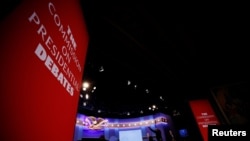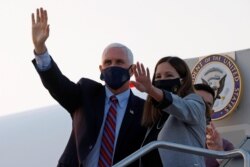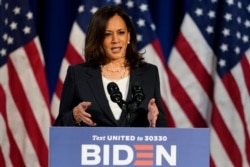The stage is set for yet another American electoral tradition, the debate between a sitting vice president and his challenger in the upcoming November election.
But Wednesday night's match-up between Vice President Mike Pence and Democratic vice-presidential candidate Senator Kamala Harris is promising to be all but traditional in the long line of political events which this year are not only upended by the coronavirus pandemic but also wrought with deep political division.
In any normal presidential election cycle, the vice-presidential debate is deemed secondary to a series of presidential candidate debates that usually generate the most memorable moments for voters.
But in the wake of 74-year-old U.S. President Donald Trump’s COVID-19 diagnosis last week, and the highly cautious campaigning style of his Democratic challenger, 77-year-old former Vice President Joe Biden, voters may take a much closer look at their younger running mates who would be poised to succeed them if necessary.
Pence, 61, a former member of Congress and governor of Indiana, will take the stage in Salt Lake City, Utah, in the unique position of debating while Trump recuperates at the White House from a deadly, contagious virus.
Meanwhile Harris, 55, a former California attorney general seeking to become the first woman and first African American to become vice president, enters the spotlight amid concerns about the age of her ticket-mate.
"This year is different not only because of the coronavirus, not only because of the fact that we may not get another presidential debate, but also the fact that we have two septuagenarians at the top of the ticket,” said Todd Belt, director of the graduate political management program at George Washington University.
“We know that one in four presidents do not finish their term in office,” he added. “And that makes Vice President Pence and Senator Kamala Harris very important in terms to watch as they may be successors to these candidates.”
When Pence takes the debate stage at the University of Utah, he will be capping a week in which he assumed the bulk of campaigning duties while Trump was hospitalized for the coronavirus. Moreover, he intends to step up his appearances after the debate, despite the inherent risks of campaigning amid a pandemic.
"All of a sudden, you have a COVID-19 outbreak in the White House that impacts the president, puts him in the hospital, is forcing the American public to think deeper about the role of the vice president," says Capri Cafaro, executive in residence at American University School of Public Affairs.
That resets expectations for the vice-presidential debate after last week's presidential debate between Trump and Biden was widely criticized for its incessant squabbling and lack of substantive content.
While vice presidential debates often are viewed as the opportunity for the two campaigns to wage bruising attacks against each other, some political experts anticipate that Pence and Harris will represent the less-antagonistic sides of their tickets.
It’s also possible — but unlikely — that the Pence-Harris clash could also mark the last in-person debate of the presidential election cycle, if Trump is unable to take part in future scheduled debates in Miami and Nashville, Tennessee, because of his health. However, Trump insisted after being released Monday from Walter Reed National Military Medical Center in Bethesda, Maryland, that he was eager to take part in the next debate.
"It adds all the more weight and meaning to the debate, particularly for the Trump-Pence ticket, that needs to find a way to change the dynamics of this race," said William Howell, Professor in American Politics at the University of Chicago Harris School of Public Policy. "They're clearly sort of six, eight points behind. They need to do something to disrupt, to alter the dynamics of this race. This is not their last chance of doing so, but it's an important opportunity for them to do so.”
To do that, analysts say Pence likely will downplay his extensive government experience and conservative values, while championing Trump’s economic and social policies, and success in shifting the federal court system and the Supreme Court much further to the right.
Pence, who has chaired the White House coronavirus taskforce, will also try his best to defend Trump’s performance in combating the virus in the U.S., despite the more than 210,600 deaths and more than 7.4 million cases of infections, according to Johns Hopkins University figures.
"He's going to do what he has always done — which is to harmonize with the president," says Howell. "He's going to repeat claims that the president has made. When he speaks with his own voice, it will only be to laud the president and he will back up Trump at most every turn. He's going to channel Trump — not his own inner Trump."
Analysts see an opportunity for Pence to link Harris to violent protests in major cities around the country over racial justice earlier this year by drawing a comparison between her record as a prosecutor and her later support for Black Lives Matter.
“I do expect some attacks from Vice President Pence in that regard," Belt said.
Harris has often drawn on her experience as the former attorney general of California to great effect in the theatrical environment of high-profile Senate hearings, pursuing relentless lines of questioning of witnesses. But debates have a very different format, experts say, and Harris will have to walk a fine line between attacking the administration's response to the pandemic while the president is still recovering from the coronavirus.
"The main thing about debates is you want to do no harm, right? Do no harm to the ticket," says Belt. "Kamala Harris is known as a fierce debater. She is a former prosecutor. We've seen how she questions people in the Senate Judiciary Committee. She likes to be on the attack.”
“But right now, that's not what the Biden campaign needs,” he said. “They're doing extremely well in the polls. Particularly in the swing states; right now she needs to just not mess anything up."
Analysts agree that while Harris will need to approach the president's illness with tact, Pence's position on the White House Coronavirus Task Force opens up the administration's record on the pandemic as fair game for criticism.
"I don't think that she will pull a lot of punches about the way that President Trump has handled this,” Cafro said. “I think she will use Vice President Pence's role on the coronavirus task force, as the head of the coronavirus task force to take the administration to task in their failures. … to have a cohesive national strategy … leading to the White House being ground zero for a major superspreader event” when Trump announced his nominee for a Supreme Court vacancy recently.
For this debate, the Commission on Presidential Debates agreed to the Biden campaign's request for additional safety measures, furthering the distance between the candidates from 7 to 13 feet apart. Unlike the presidential debate, Pence, Harris and debate moderator Susan Page may be behind Plexiglass screens.
While coronavirus will likely dominate the discussion, analysts say the upcoming battle over Trump's Supreme Court nominee, appeals court judge Amy Coney Barrett, will figure heavily as well.
"Senator Harris serves on the Judiciary Committee and the fact that Vice President Pence is the president of the Senate, I think that a debate over a Supreme Court nominee and the replacement of Ruth Bader Ginsburg and the implications of a shift in balance in the courts is going to be a huge part of this debate," Cafaro says.






